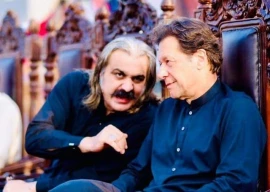
Qiyamuddin Kashaf, the spokesman for the High Peace Council, also appealed to all Muslim nations for help brokering an end to a war now in its 10th year, and repeated Kabul and Washington's longstanding demand that militants renounce violence.
Inducements to tempt fighters back into the government fold could include jobs, homes and cash, Kashaf told a news conference in the Afghan capital.
"The High Peace Council expects the Islamic world, in particular the (Organisation of the) Islamic Conference, and the Saudi king, to support the pious people of Afghanistan in achieving peace," Kashaf said, reading from a council statement.
When pressed what role Saudi Arabia could play, and why he mentioned them, Kashaf said it was one of three nations that recognised the Taliban government, has good ties with Pakistan, and is custodian of the holiest Islamic sites.
Saudi Arabia sponsored secret talks last year and has acted as an interlocutor between Afghan officials and Taliban commanders in the past.
The 70-member council was proposed by President Hamid Karzai to seek a negotiated end to decades of violence and endorsed by a jirga, or traditional gathering, earlier this year.
It had settled on the mechanism it wishes to use as a road map for starting negotiations, Kashaf said, focused on seeking an "honourable" way for militants to return to mainstream society.
"This honourable return involves position, house, salary and self-respect. They want concessions and we will give them," he told a news conference, but declined to give further details.
"The High Peace Council is earnestly asking Afghanistan's armed opposition and their leaders to give up violence and join the peace process," Kashaf added, reading from the council's first statement after days of deliberation.
"Organised propaganda"
NATO and Afghan officials have confirmed preliminary contacts between Karzai's government and the Taliban. The militant group issued a statement on Thursday describing the reported talks as "mind-boggling lies" and "organised enemy propaganda".
"The Islamic Emirate of Afghanistan refutes outright these false claims, neither has it sent any delegations for talks and neither does it intend to negotiate at a time when the country is under occupation," the Taliban statement said.
The Taliban have always pushed for the withdrawal of the nearly 150,000 foreign forces now in Afghanistan as their main condition for holding talks with Karzai's government.
For years, both Karzai and Washington have demanded that any militants wanting to talk must first renounce violence, cut ties with al Qaeda and accept the new constitution, which has been repeatedly rejected by the Taliban.
Peace Council chief Burhanuddin Rabbani recently suggested that he might be willing to leave more room for manoeuvre, saying the body was independent and willing to be flexible about preconditions for any discussions with the militant insurgents.
If calls for a renunciation of violence are a sign the council plans to stick to Karzai's longstanding demands, it could complicate efforts to reach out to insurgents.

1729161093-0/liam-(4)1729161093-0-165x106.webp)


1732603002-0/lamar-(4)1732603002-0-165x106.webp)
1732608486-0/BeFunk_§_]__-(54)1732608486-0.jpg)
1732604291-0/BeFunk_§_]__-(52)1732604291-0.jpg)

1732606500-0/BeFunk_§_]__-(53)1732606500-0.jpg)








COMMENTS
Comments are moderated and generally will be posted if they are on-topic and not abusive.
For more information, please see our Comments FAQ